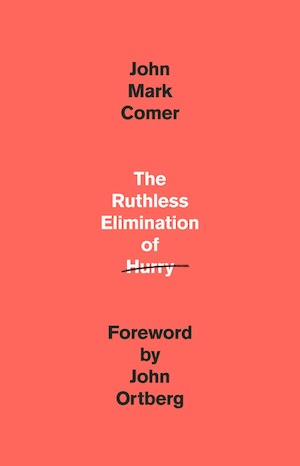As I start reading Practicing the Way, John Mark Comer’s bestseller from 2024, I realise I had been meaning to share a few thoughts on his 2019 bestseller, The Ruthless Elimination of Hurry, which I read a couple of years ago.
First, the style.
It’s a bit.
Like this.
I recently shared a link to a very thoughtful post by Samuel D. James on the style of John Mark Comer’s books: The Ruthless Elimination of Paragraphs. The post is behind a paywall now, but if I recall, the basic point is that Comer’s books are light on actual argument, which is the traditional role of a paragraph. The book is extremely readable and very practical, but it’s the kind of book you can read very quickly. I found myself agreeing with much of the book, but the problem with Comer’s style is that it doesn’t force you to think deeply.
The basic claim of the book is exactly as it says on the tin: that we need to be ruthless in eliminating hurry. At times, Comer seems to write as if this is a problem faced by everyone. It certainly resonated with me, but I wonder whether it is quite as widespread as he seems to assume. Perhaps in some contexts it might seem as if everyone is going through life on overdrive, but in my own experience, I keep encountering people who have a much healthier pace of life.
The solution is to copy Jesus, especially in adopting ‘four practices for unhurrying your life’:
- Silence and solitude
- Sabbath
- Simplicity
- Slowing
There is a lot of helpful advice in here, but I found Comer’s approach to sabbath somewhat jarring. The biblical sabbath is thoroughly communal: everyone stops work, and everyone rests (and worships) together. Comer’s sabbath, in contrast, is something that individuals or families might practise at a time that suits them. For Comer and his family, it starts on a Friday evening and finishes on a Saturday evening – not because this is the timing of the Jewish sabbath, but because this fits in with their schedule, especially his busy schedule on a Sunday, as a pastor.
As a church minister, I’ve grappled with this myself. I’m quite ‘religious’ about my day off, and it certainly gives me a break from ‘the pressure of my concern for all the churches’ (2 Corinthians 11:28). But I’m also quite determined that Sundays should be a day that I find uplifting and refreshing. I want Sunday to be something of a ‘sabbath’ for me, and not just for my congregations.
Comer clearly reads extensively, and the notes at the end of the book are filled with glowing recommendations. Here are a few of the resources he recommends (*extremely highly), roughly in the order in which they are mentioned in the book:
- Peter Scazzero
- John Ortberg
- Eternity Is Now in Session (2018)
- Soul Keeping (2014)
- The Me I Want to Be (2014)
- *The Life You’ve Always Wanted (2002)
- Dallas Willard
- *Renovation of the Heart (2002)
- The Divine Conspiracy (1998)
- *The Spirit of the Disciplines (1988)
- The Great Omission (2006)
- Life Without Lack (2018)
- Ronald Rolheiser
- *Sacred Fire (2014)
- The Shattered Lantern (2005)
- Ruth Haley Barton
- Richard Foster
- Celebration of Discipline (1998)
- Freedom of Simplicity (2005)
- Eugene Peterson
- The Pastor: A Memoir (2011)
- Walter Brueggemann
- Sabbath as Resistance (2014)
- Alan Fadling
- An Unhurried Life (2013)
- Frank Laubach
- Letters by a Modern Mystic (2007)
This should give some idea of where John Mark Comer is coming from.
